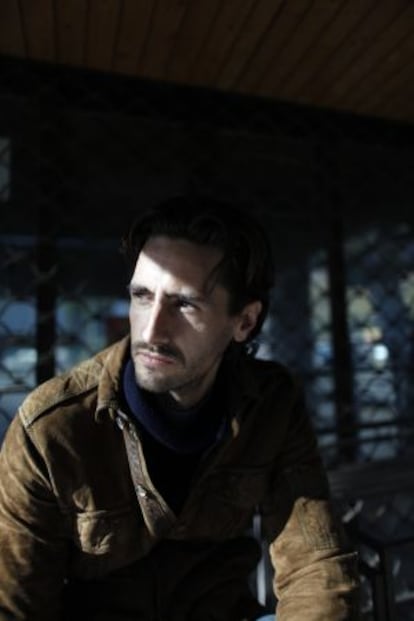“I am a child of exile. Imagining my life differently is like science-fiction”
Best known for his movie roles, actor Juan Diego Botto has just triumphed as a playwright

He takes off the dark coat that has been protecting him from the Madrid cold and sits down to await the questions. He doesn’t have to make too much of an effort — actor Juan Diego Botto is a good conversationalist. He has a lot of things to say and likes saying them. But the 37-year-old is not one of these overpoweringly verbose types who try to convince you of everything and nothing. The conversation proceeds in the intimate tone created by the warm voice of this performer, whose career has just taken a giant leap forward with his latest theater project, Un trozo invisible de este mundo (or, An invisible piece of this world), which he has written himself and in which he stars. A collection of five monologues on exile and immigration, it has been praised by critics and the public alike.
It is film roles, however, for which he is best known. Stories from the Kronen, Plenilunio, Martín (Hache), The Dancer Upstairs, Vete de mí, El Greco and Silencio en la nieve are just some of the movies in which he has starred and three Goya nominations are testament to the fact his slender frame and intense features make an impression on the big screen.
But on stage he is captivating. “He is a man of the theater; he has it in his veins. Now he is one of the greats,” writes one reviewer.
“In the theater I’ve always done personal projects,” he says. “It means having the possibility of telling something closer to me.”
All of us are conditioned by our parents, and in the case of Botto it’s difficult to imagine how his life would have turned out without his family background. His father, the actor Diego Fernando Botto, disappeared at the age of 28 after he was arrested during Jorge Rafael Videla’s dictatorship in Argentina in 1977. His mother, Cristina Rota, also an actress as well as a drama teacher, arrived in Spain as an exile one year later with her two children, María, four, and Juan Diego, three.
“I am a child of exile,” Botto says. “It seems like science-fiction to imagine my life... it would have been different, I would be living in Buenos Aires; I don’t know if I would be an actor. Do I think how I think because my father suffered what he suffered and we had to go into exile? I don’t know. It is a relevant factor, but each to his own, and other factors have had a influence.”
He made his movie debut at the age of five — a natural occurrence, bearing in mind his living room was where his mother gave her drama classes. “I remember coming back from school and hearing them do Shakespeare, Chekhov or whoever.” His 2008 production of Hamlet, where he played the Danish prince not as an angry man out for revenge but as someone trying to discover the truth, made audiences and critics take notice and marked a new era in tackling the play.
Now El trozo invisible de este mundo has allowed many people to discover Botto the author, capable of tackling loneliness, rootlessness, social injustice and in a way that makes them laugh as much as reflect. “I like to write, to talk and tell stories in the way it interests me to do so,” he says. “It is a way of feeling you’re contributing. With El trozo... it is the first time that people have thanked and not congratulated me [...] The day after the premiere we only had 40 people in the audience, but during the last week-and-a-half we performed in Madrid it sold out every night. What has really worked with this play has been word of mouth.”
Tu suscripción se está usando en otro dispositivo
¿Quieres añadir otro usuario a tu suscripción?
Si continúas leyendo en este dispositivo, no se podrá leer en el otro.
FlechaTu suscripción se está usando en otro dispositivo y solo puedes acceder a EL PAÍS desde un dispositivo a la vez.
Si quieres compartir tu cuenta, cambia tu suscripción a la modalidad Premium, así podrás añadir otro usuario. Cada uno accederá con su propia cuenta de email, lo que os permitirá personalizar vuestra experiencia en EL PAÍS.
¿Tienes una suscripción de empresa? Accede aquí para contratar más cuentas.
En el caso de no saber quién está usando tu cuenta, te recomendamos cambiar tu contraseña aquí.
Si decides continuar compartiendo tu cuenta, este mensaje se mostrará en tu dispositivo y en el de la otra persona que está usando tu cuenta de forma indefinida, afectando a tu experiencia de lectura. Puedes consultar aquí los términos y condiciones de la suscripción digital.









































